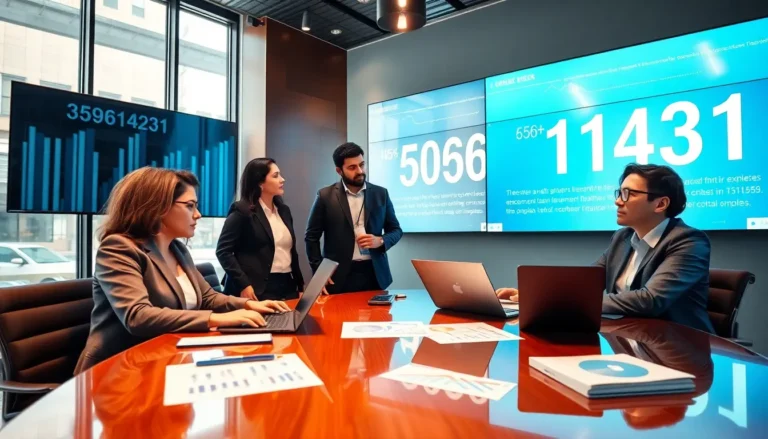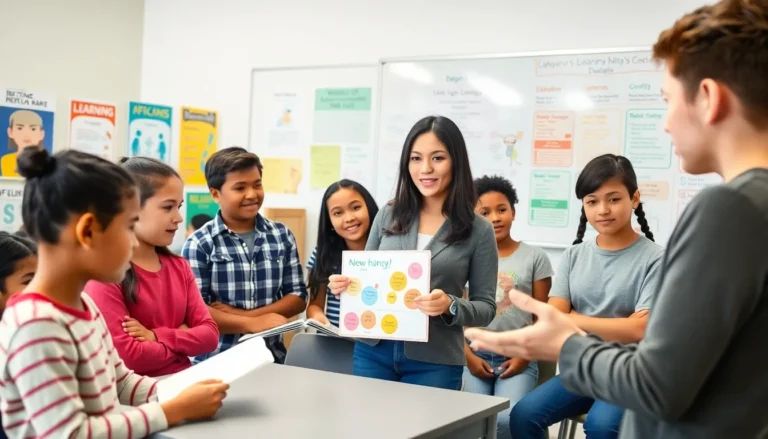Table of Contents
ToggleMastering language conversational skills is essential in today’s interconnected world. Whether in personal relationships or professional settings, effective communication can foster understanding and build stronger connections. It’s not just about what’s said but how it’s delivered, making the nuances of conversation a vital area of focus.
Developing these skills enhances one’s ability to engage in meaningful dialogue, express thoughts clearly, and listen actively. As conversations become more diverse and dynamic, honing these abilities can lead to greater confidence and success in various interactions. This article will explore key strategies to improve conversational skills and unlock the potential for richer exchanges.
Understanding Language Conversational Skills
Language conversational skills refer to the ability to engage effectively in dialogue, facilitating clear communication and fostering relationships. Mastering these skills enhances interactions in personal and professional environments.
Definition and Importance
Conversational skills encompass the verbal and non-verbal techniques used during interactions. They encompass effective speaking, active listening, and appropriate body language. The importance of these skills lies in their ability to create understanding, minimize misunderstandings, and build rapport. Effective conversational skills can significantly enhance teamwork, negotiation outcomes, and interpersonal relationships.
Components of Conversational Skills
- Active Listening: Engaging fully with the speaker and demonstrating attentiveness through nodding and verbal affirmations.
- Clear Articulation: Expressing thoughts and ideas distinctly to ensure comprehension across different audiences.
- Empathy: Understanding and acknowledging the feelings and perspectives of others in conversations.
- Body Language: Utilizing appropriate facial expressions, gestures, and posture to reinforce spoken words.
- Questioning Techniques: Employing open-ended and clarifying questions to facilitate deeper discussions and gather more information.
- Adaptability: Adjusting communication style based on the context and the responses of conversational partners.
Developing Language Conversational Skills

Developing language conversational skills hinges on practical techniques that enhance dialogue effectiveness. Implementing effective listening strategies and engaging actively in conversations can create more meaningful interactions.
Effective Listening Techniques
Effective listening enhances communication clarity and fosters mutual understanding. Key techniques include:
- Pay full attention: Focus entirely on the speaker, minimizing distractions such as phones or background noise.
- Show interest: Use non-verbal cues like nodding and maintaining eye contact to indicate engagement.
- Reflect back: Paraphrase or summarize what the speaker says to confirm understanding and encourage further discussion.
- Ask clarifying questions: Seek specifics when unclear, which demonstrates interest and promotes deeper conversation.
- Avoid interrupting: Let the speaker finish their thoughts before responding, which shows respect and allows for comprehensive communication.
Engaging in Active Dialogue
- Ask open-ended questions: Encourage expansive responses by posing questions that require more than yes or no answers.
- Share personal experiences: Relate to topics discussed, which reinforces connection and keeps the conversation flowing.
- Acknowledge others’ perspectives: Validate the speaker’s views even when disagreeing, promoting a collaborative atmosphere.
- Adapt communication style: Adjust tone and vocabulary based on the audience and context to ensure clarity.
- Practice turn-taking: Balance contributions to maintain an engaging dialogue without over-dominating the conversation.
Challenges in Language Conversational Skills
Understanding the challenges in language conversational skills aids in identifying strategies for improvement. Numerous obstacles can inhibit effective communication, often stemming from various factors.
Common Barriers to Effective Communication
Barriers to effective communication include the following:
- Language Proficiency: Limited vocabulary or grammar knowledge restricts the ability to express thoughts clearly.
- Cultural Differences: Variations in cultural norms can lead to misunderstandings, affecting message interpretation.
- Emotional Factors: Anxiety, stress, or excitement may interfere with clarity and articulation during conversations.
- Distractions: Environmental noise or distractions can hinder focus, making it difficult to engage fully in dialogues.
- Lack of Feedback: Absence of affirming responses can create confusion regarding message reception and understanding.
Overcoming Language Proficiency Issues
- Practice Regularly: Engaging in daily conversations enhances fluency and comfort in using different vocabulary and grammar.
- Expand Vocabulary: Reading various materials, such as books, articles, or blogs, aids in acquiring new words and phrases.
- Utilize Language Apps: Leveraging language learning apps offers interactive learning experiences and opportunities to practice speaking.
- Engage in Conversations: Participating in language exchange groups allows for practical application of skills with native speakers or fellow learners.
- Seek Feedback: Soliciting constructive criticism from peers or mentors helps identify areas for improvement and builds confidence.
Tools and Resources for Improvement
A variety of tools and resources enhance language conversational skills, enabling individuals to practice and refine their abilities effectively. From mobile applications to interactive workshops, each resource serves as a valuable aid in building better communication.
Language Learning Apps
Language learning apps offer engaging platforms for improving conversational skills. Features commonly include:
- Interactive Exercises: Users participate in exercises that simulate real-life conversations, honing their speaking abilities.
- Speech Recognition: This technology helps learners refine their pronunciation through instant feedback, promoting clearer articulation.
- Real-World Scenarios: Many apps present scenarios that mirror everyday situations, fostering adaptability and comfort in diverse conversations.
- Community Access: Users connect with native speakers or other learners, providing opportunities for practice and cultural exchange.
Popular apps, such as Duolingo, Babbel, and HelloTalk, cater to various proficiency levels and learning styles, making language acquisition more accessible.
Communication Workshops
Communication workshops provide structured environments for skill development through hands-on practice and expert guidance. Key benefits include:
- Interactive Activities: Participants engage in role-playing and group discussions, enhancing active listening and empathy.
- Personalized Feedback: Instructors offer constructive feedback, helping individuals identify areas for improvement and focusing on specific challenges.
- Networking Opportunities: Workshops foster connections among participants, allowing for the exchange of insights and experiences that enrich learning.
- Thematic Focus: Many workshops address specific aspects of communication, such as public speaking, negotiation skills, or cross-cultural communication, catering to varied interests and needs.
Organizations like Toastmasters and local community centers frequently host communication workshops, providing valuable resources for individuals seeking to improve their conversational skills.
Mastering language conversational skills is essential for fostering meaningful interactions and building strong relationships. By focusing on active listening and effective engagement, individuals can significantly enhance their communication abilities. Overcoming barriers and utilizing available resources can lead to improved proficiency and confidence in conversations.
Investing time in developing these skills pays off in both personal and professional arenas. With practice and the right tools, anyone can become a more effective communicator. Embracing these strategies opens the door to richer dialogues and deeper connections, ultimately paving the way for success in various aspects of life.







